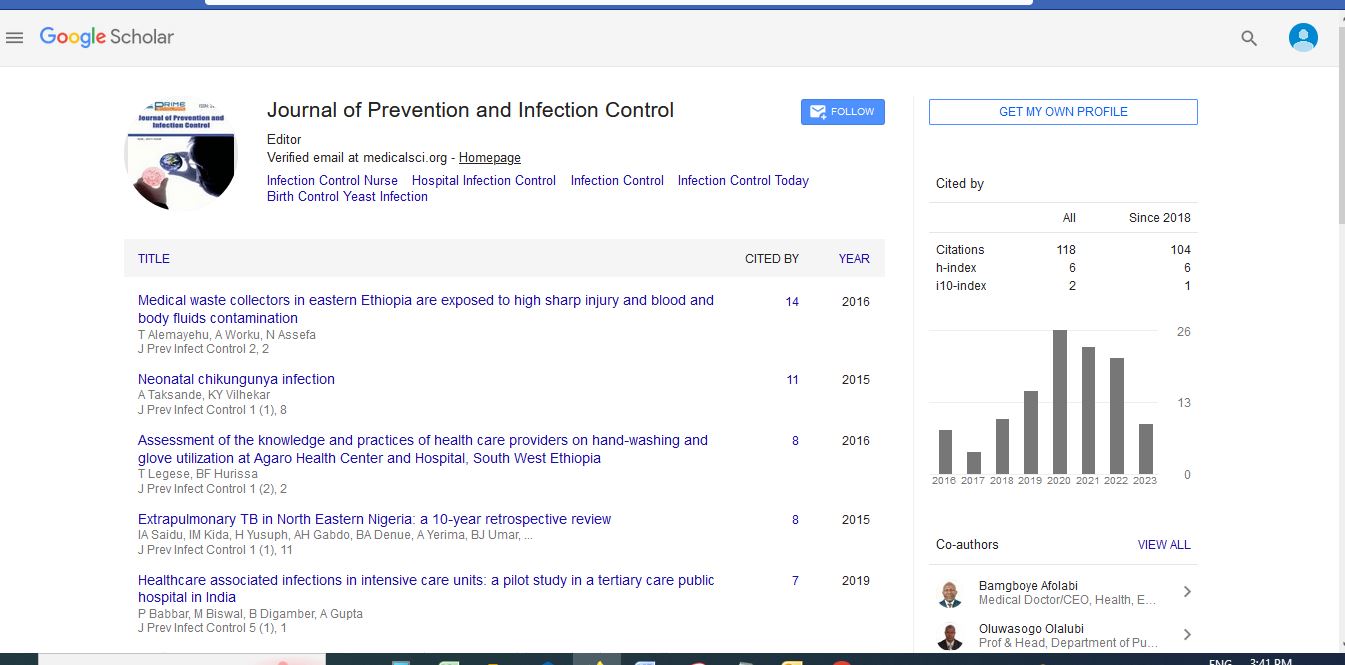Bamgboye M Afolabi*
Health, Environment and Development Foundation, Yaba, Lagos, Nigeria
Corresponding Author:
Bamgboye M Afolabi
Health, Environment and Development Foundation
Yaba, Lagos, Nigeria
Tel: +19548640860
E-mail: bmafolabi@gmail.com
Received date: July 18, 2016; Accepted date: July 18, 2016; Published date: July 18, 2016
Citation: Afolabi BM. Prevention & Infection Control: Editors Note. J Prev Inf Cntrl. 2016, 2:1.
Editor’s Note
Infection control is the discipline concerned with preventing community- or hospital-acquired infection. In practice; however, it is a sub-discipline of epidemiology. Many anti-infective agents such as antibacterial, antifungal, antiviral, antibiotics, and antiprotozoans have been produced for this purpose. Patients usually come in contact with nosocomial diseases, while under medical care, because, while in hospital, they may be exposed to organisms that are resistant to antibiotics. The present Journal of Prevention & Infection control publishes articles on recent advancements in controlling nosocomial infections. There are 3 research articles, 1 case report and an editorial in the current issue of the Journal (Volume 2, Issue 1).
Oscarsson et al. presented a design to observe and collect information on compliance to basic intraoperative hygiene conduct in operating theatres in Mozambique. The study revealed that none of the staff followed WHO guidelines. Majority of theatre staff’ responded positively relative to “Teamwork within the Hospital Units” whereas, the least positive responses were drawn from the “Nonpunitive Response to Error” and “Staffing.” The hospital staffs indeed were acting as a medium in transferring the pathogens which brought about great concern over patient’s safety. They were placing emphasis on the importance of complying with the basic hand hygiene. This study concludes that compliance with basic hygiene during intraoperative phase in theatre was not satisfactory. Developing a positive attitude among hospital staff is important and urgently needed when patient safety is concerned. This would play a major role in reducing the number of surgical site infections [1].
Legese et al. designed a cross-sectional study to assess the knowledge and practice of glove utilization and hand washing among health care providers of Agro health center and hospitals to prevent nosocomial infection. The results of this crosssectional study informed that nearly 80.9% of the respondents agreed that many infections which occur in health care units could be prevented by proper and consistent hand wash. However, 82.2% of participants of this study admitted that they conform to this practice regularly in case of contact with body fluids. From this study, it is clear that the participants had adequate knowledge and practice of hand washing and aseptic techniques for the prevention of nosocomial infections [2].
Goni et al. documented the problem of extra-pulmonary TB in north-eastern Nigeria. For this, they piloted a cross-sectional study of DOTS treatment center in tertiary hospital in northeastern Nigeria and they reviewed nearly 1240 patients over 10- year period. Out of 1240 treated patients 14.4% suffered from extra-pulmonary TB, in which TB lymphadenitis and skeletal TB were prominent. Regarding HIV information only 56.4% had knowledge on their HIV status, among whom 51.5% were positive. Therefore, there is need to develop HIV screening test for TB patients accessing treatment at the facility [3].
Dengue is one of the mosquito-borne diseases which affect health of humans; nearly 2.5 billion people are suffering from this disease. It is transmitted by bites of Aedes aegypti mosquito. Taksande and Suwarnakar [4], presented a case report of a typical manifestation of under reported dengue fever. In this case report they discussed an 11-year-old boy with dengue fever who developed hypotension and bradycardia. During bradycardia, his electrocardiogram showed a junctional rhythm which was spontaneously resolved. Thus, they concluded that rhythm abnormalities which occur in dengue fever are self-limited and resolve spontaneously.
Kelleni in his editorial informed about antibiotic resistance as a major problem in many developing countries that result in horrible loss of lives. In addition, multidrug resistance has been associated with three-fold increase of risk in hospital mortality. He stated that 72% of isolates from Egyptian hospitals are resistant to third generation of cephalosporins and another 38% of isolates presented with multi-resistance to antibiotics [5].
References
- Oscarsson R, Swenne CL (2016) Compliance to intraoperative basic hygiene and patient safety culture in Mozambique. J Prev Inf Cntrl 2: 1.
- Legese T, Fekecha B (2016) Hurissa assessment of the knowledge and practices of health care providers on hand-washing and glove utilization at agaro health center and hospital, South West Ethiopia. J Prev Inf Cntrl 2: 1.
- Goni BW, Bakki B, Saidu IA, Kida IM, Yusuf H, et al. (2016) Extrapulmonary TB in North Eastern Nigeria: A 10-year retrospective review. J Prev Inf Cntrl 2: 1
- Taksande A, Suwarnakar K (2016) Spontaneous resolution of junctional rhythm in a child with dengue fever. J Prev Inf Cntrl 2: 1.
- Kelleni MT (2016) Cefotaxime used as paracetamol-antibiotic resistance in developing countries, a global upcoming catastrophe unless urgently addressed. J Prev Inf Cntrl 2: 1.

